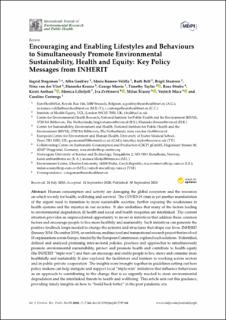| dc.contributor.author | Stegeman, Ingrid | |
| dc.contributor.author | Godfrey, Alba | |
| dc.contributor.author | Romeo-Velilla, Maria | |
| dc.contributor.author | Bell, Ruth | |
| dc.contributor.author | Staatsen, Brigit | |
| dc.contributor.author | van der Vliet, Nina | |
| dc.contributor.author | Kruize, Hanneke | |
| dc.contributor.author | Morris, George | |
| dc.contributor.author | Taylor, Timothy | |
| dc.contributor.author | Strube, Rosa | |
| dc.contributor.author | Anthun, Kirsti Sarheim | |
| dc.contributor.author | Lillefjell, Monica | |
| dc.contributor.author | Zvěřinová, Iva | |
| dc.contributor.author | Ščasný, Milan | |
| dc.contributor.author | Máca, Vojtech | |
| dc.contributor.author | Costongs, Caroline | |
| dc.date.accessioned | 2022-12-16T09:06:30Z | |
| dc.date.available | 2022-12-16T09:06:30Z | |
| dc.date.created | 2021-02-27T12:50:24Z | |
| dc.date.issued | 2020 | |
| dc.identifier.citation | International Journal of Environmental Research and Public Health (IJERPH). 2020, 17:7166 (19), 1-22. | en_US |
| dc.identifier.issn | 1661-7827 | |
| dc.identifier.uri | https://hdl.handle.net/11250/3038184 | |
| dc.description.abstract | Human consumption and activity are damaging the global ecosystem and the resources on which we rely for health, well-being and survival. The COVID-19 crisis is yet another manifestation of the urgent need to transition to more sustainable societies, further exposing the weaknesses in health systems and the injustice in our societies. It also underlines that many of the factors leading to environmental degradation, ill health and social and health inequities are interlinked. The current situation provides an unprecedented opportunity to invest in initiatives that address these common factors and encourage people to live more healthily and sustainably. Such initiatives can generate the positive feedback loops needed to change the systems and structures that shape our lives. INHERIT (January 2016–December 2019), an ambitious, multisectoral and transnational research project that involved 18 organisations across Europe, funded by the European Commission, explored such solutions. It identified, defined and analysed promising inter-sectoral policies, practices and approaches to simultaneously promote environmental sustainability, protect and promote health and contribute to health equity (the INHERIT “triple-win”) and that can encourage and enable people to live, move and consume more healthfully and sustainably. It also explored the facilitators and barriers to working across sectors and in public private cooperation. The insights were brought together in guidelines setting out how policy makers can help instigate and support local “triple-win” initiatives that influence behaviours as an approach to contributing to the change that is so urgently needed to stem environmental degradation and the interlinked threats to health and wellbeing. This article sets out this guidance, providing timely insights on how to “build back better” in the post pandemic era. | en_US |
| dc.language.iso | eng | en_US |
| dc.publisher | MDPI | en_US |
| dc.rights | Navngivelse 4.0 Internasjonal | * |
| dc.rights.uri | http://creativecommons.org/licenses/by/4.0/deed.no | * |
| dc.title | Encouraging and enabling lifestyles and behaviours to simultaneously promote environmental sustainability, health and equity: Key policy messages from inherit | en_US |
| dc.title.alternative | Encouraging and enabling lifestyles and behaviours to simultaneously promote environmental sustainability, health and equity: Key policy messages from inherit | en_US |
| dc.type | Peer reviewed | en_US |
| dc.type | Journal article | en_US |
| dc.description.version | publishedVersion | en_US |
| dc.source.pagenumber | 1-22 | en_US |
| dc.source.volume | 17:7166 | en_US |
| dc.source.journal | International Journal of Environmental Research and Public Health (IJERPH) | en_US |
| dc.source.issue | 19 | en_US |
| dc.identifier.doi | 10.3390/ijerph17197166 | |
| dc.identifier.cristin | 1894214 | |
| cristin.ispublished | true | |
| cristin.fulltext | original | |
| cristin.qualitycode | 1 | |

